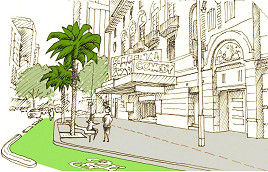Magpie Nest – an example of disruptive thinking
It was 10 years ago, almost to the day when a young mother entered our café at 69 Bourke St, Melbourne. The café works with people who are homeless, at risk of homelessness and are often dealing with a complex range of issues including mental health, physical health issues and often social isolation.
The young mum stood in the middle of the café with her six-year-old daughter. The young woman was completely distraught, to the point where she could barely speak. It was our busy lunch-time period, and it was difficult to understand what was happening for this young family. We eventually found a quiet place in the building and the woman’s story came tumbling out.
She had recently escaped a violent family situation with her young daughter. She had no idea where to go or what to do, so a family friend suggested that she head to a rooming house. Tess* was informed that she wouldn’t need to pay bond or provide any references. She could immediately move in. All she needed to do was pay her weekly rent.
After about four weeks, everything had been going reasonably well. Then Tess discovered that the man living the in the room next to her and her six-year-old daughter had a history of child sex offences. This young mum was doing all that she could to keep her daughter safe, but she was feeling that she had put her young daughter in harm’s way.
This was the first time that we had heard this story. It was becoming a common theme. We were unsure about what to do because affordable housing options were limited, even 10 years ago!
I arranged a meeting with Collingwood Football Club to see if they might be interested in getting involved in some capacity. Why Collingwood you might ask? It was Collingwood’s history and its values that caused me to think that it could be a useful ally to help us address what was fast becoming a pernicious issue. Also, “the usual suspects” that help address wicked problems were providing the same “solutions”, but unfortunately with no major impact. It was time to think outside of the box.
Collingwood Football Club initially rented two houses in its name. It made the houses available to us to provide accommodation to people that were committed to ending their homelessness.
The Lord Mayor’s Charitable Foundation provided initial funding so that we could employ case workers that would work intensively with the individuals so that we could help them reintegrate with the community and start to live independently, in their own accommodation.
Ten years on, Magpie Nest now has 50 houses with 130 people off the streets in their own accommodation.
Many of the houses are rented from the private rental market. However, in a market where affordable rental properties are becoming highly sort after, we need to find a more sustainable model.
The Collingwood Foundation, as part of the Collingwood Football Club, has been brilliant supporting the Magpie Nest model to date, but it is passionate about exploring new and sustainable models going forward.
Coles has also been superb in providing support to the Magpie Nest program.
The Victorian Government has provided excellent ongoing financial support to the program as well. It is this funding that has enabled us to provide case workers who have done an excellent job in supporting individuals and families to address the drivers for their homelessness.
It is often assumed that if you provide accommodation to a person, then it is job done. But the reality is if we are not addressing the drivers for their situation, they will often cycle out of the accommodation and end up living on the streets again.
The role of the case worker is fundamental in also helping build an individual’s confidence again. Without confidence, they will often remain withdrawn from any further engagement with society.
Collingwood, Coles and the Victorian Government have provided a level of passion, dedication and long-term commitment to a group of people that are often forgotten. With their unwavering support and encouragement, more than a thousand people have received practical and emotions support that has enabled the forgotten to be reintegrated back into society. •

Council endorses office tower at Flinders Lane despite querying car park demolition



 Download the Latest Edition
Download the Latest Edition